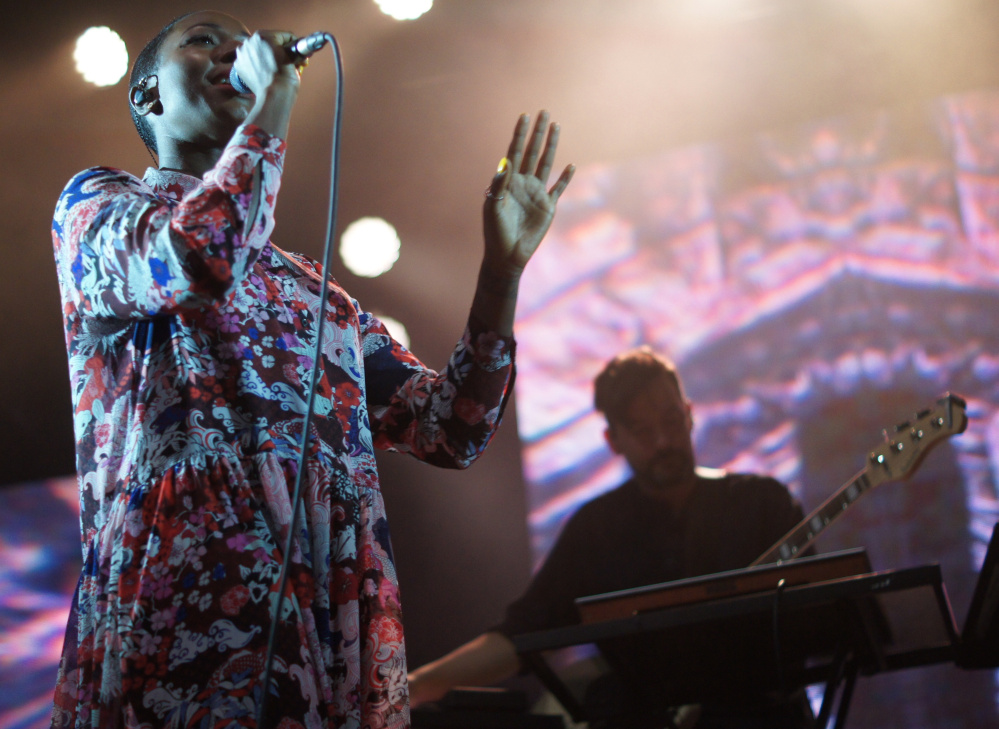British musician and DJ Simon Greene began making music as Bonobo in 2000, releasing music on Ninja Tune, an independent label known loosely for electronic music that folds in eclectic influences ranging from hip-hop to jazz. In the mid-2000s, he experienced a career breakthrough as he began coloring his beats with bright melodies and jazz influences, drawing particular acclaim for his 2006 album “Days to Come.”
At roughly this time, he also put together a band of musicians to bring his compositions to life onstage. They’ve steadily toured and hit the festival circuit in the decade that followed, arriving in Maine for the first time ever on Friday.
Despite the fact that he had a full band with him, the concert was structured like a DJ set – he eased the crowd in, slowly brought them up to peak energy, and then gently cooled them off.
Both the opening third and the closing third featured soulful melodies and rich, emotional textures, drawing primarily from his more mature albums this decade, including the lion’s share of this year’s “Migration.”
These songs frequently featured vocals by Szjerdene, a warm, charismatic frontwoman who seemed to braid her singing indelibly through the band’s midtempo breakbeats.
They played “Kiara” and “Kong” in close proximity to one another, similar to how these songs set the mood for 2010’s “Black Sands” album, shifting the haunting, minor-key strings of the former song into the more luxurious jazz organ of the latter. During these stretches, Greene also showed off his own musical proficiency, playing several traditional instruments and steering the ship from behind a massive setup of laptops and electronic gear.
The only real issue with the concert’s structure is that a DJ set – such as the six-hour set that Greene regularly performs as part of his residency at the Brooklyn club Output – has a much longer peak in the middle. Maine audiences are starved for big dance-music shows, and they clearly relished the concert’s centerpiece, when the beats hit harder and more closely resembled house music, the band frequently pulled the drums for psychedelic detours before dramatically bringing them back harder than before, and the light show and fog machines seemed to warp reality in dreamlike, euphoric directions.
This mini-suite of songs kicked off roughly with “Bambro Koyo Ganda,” a true banger from “Migration,” and lasted about 20 minutes, with one song bleeding into the next one beautifully.
This section of the show was arguably highlighted by the Latin percussion and infectious guitar hook of “We Could Forever,” and gave more opportunity to show off the band’s versatility. How many acts effectively break out a live flute to generate the accompanying melody for a thumping club beat?
More moments like this would have been welcome, but one would have to strain to find fault with the sophisticated, frequently meditative music that bookended this passage.
Bonobo doesn’t typically have an opening act, but the venue and band were kind enough to invite Portland artist Mosart212 to warm up the crowd. Mo’s typically blissful compositions proved to be an ideal complement to Bonobo’s set, also proving that Portlanders don’t have to wait for quality electronic music to come to them.
Robert Ker is a freelance writer who lives in Portland.
Send questions/comments to the editors.



Comments are no longer available on this story